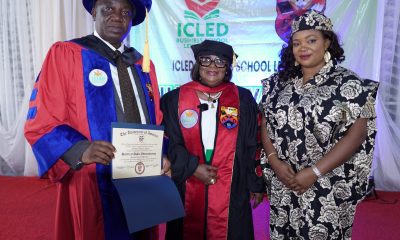Comments and Issues
Justice Gladys Olotu’s case and NJC’s multiple standards
Published
7 years agoon
By
Olu Emmanuel
By Law Mefor
In Dr. Olu Olagoke’s evergreen book, ‘The Incorruptible Judge’, the issue is captures thus: “If the citadel of justice is corrupt, what will happen to the body politic? It will be completely rotten and collapse.” This is the question befitting the nation’s Temple of Justice at the moment, especially the inexplicable contradictions in the decisions of the quality control agency of the Nigerian judiciary – the National Judicial Council (NJC).
It will be recalled that the widespread corruption in the judiciary led to the so-called ‘sting operation’ by the Department of State Services (DSS) in which the residences of seven justices of state and federal courts were arrested at midnight. Fact is the way and manner the NJC operates will always encourage corruption in the Judiciary because it has different sets of rules for judges from different backgrounds.
Psychological research has it that one certain way of destroying any system or organization is to treat its members differently, for both rewards and punishments. Yet, this is precisely what NJC appears to be doing with the Nigerian judiciary, which will be shown with a few brazen examples and yet expecting positive results.
It was since March, 2014 that the article “NJC and the Olotu Integrity Test” appeared in Sahara Reporters. The obvious miscarriage of justice and inhuman treatment meted out to Justice Gladys Olotu by the Nigerian Judicial Council (NJC) is still baffling. But we shall soon see that she is not even alone though her case of dismissal from service and the bench is without a doubt overkill since that was not the proper punishment for her action even if she must be punished at all.
The NJC claims it is ensuring the dispensation for justice to Nigerians by ensuring quality control in the judiciary but does not appear to be dispensing justice to its own personnel as exemplified in the Justice Gladys Olotu’s curious case. Most Nigerians aware of Olotu’s case would be quite scandalised to read recently that the current Chief Justice of Nigeria, His Lordship Walter Onneghen, is under pressure to reinstate her, which showed that her matter has lingered for this number for years.
One has equally reviewed many disciplinary cases in the judiciary at the apex levels within these intervening years and discovered that there is nothing objective in the methods the NJC employs in handling disciplinary matters. Much is left to the whims of serving members of the council and man-know-man rather than to the course of justice as should be the case.
In summary, the NJC seems to be shielding some categories of judges while going after others with the sledgehammer. Before we come to the examples, let us look at the foundation of the agency as the clearing house of the Nigerian judiciary. The National Judicial Council is one of the Federal Executive Bodies created by virtue of Section 153 of the 1999 Constitution of the Federal Republic of Nigeria. In order to insulate the Judiciary from the whims and caprices of the Executive; hence guarantee the independence of this Arm of Government, which is a sine qua non for any democratic Government, the National Judicial Council was created and vested with enormous powers and functions, which the erstwhile Advisory Judicial Committee (AJC) it replaced, did not have. It is wrongly chaired by the serving Chief Justice of the Federation and has powers for recommending dismissal of judges also.
Without standards and with the manifest ambience for bias, how can the performance of such all-important agency not be underwhelming? Several contradictory disciplinary actions taken by the NJC in the last couple of years, compared to the fate the same body has consigned Olotu’s case; prove the assertion beyond any doubt.
In February 2016, the NJC found that Justice Ajumogobia did not deliver judgement in a pre- election matter until the termination of the life span of the Ogun State House of Assembly. Her punishment: she was warned against any act of misconduct, put on its so-called watch-list for 4years and ruled out any possible elevation to the Court of Appeal throughout her judicial career and would not be considered for any ad-hoc judicial assignment throughout her career on the bench.
In April 2016, 2 months after Justice Ajumogobia’s case, Justice O. Gbajiamila of the Lagos High Court was retired compulsorily on the recommendations of the same NJC because he did not deliver a judgement within 90 days as prescribed by the Constitution. In November 2015, Justice Lambo Akanbi of the Federal High Court was compulsorily retired on the recommendations of the same NJC amongst others for delivering a judgement 4 months after the 90days prescribed by the Constitution.
ALSO SEE: Special Investigation: How Mukhtar railroaded Jonathan into retiring Olotu
Even the Presidency recently lambasted the National Judicial Council for reinstating suspended judges under probe, accusing the body of condoning corruption. It was the Special Adviser to the President on Prosecutions, Okoi Obono-Obla, who declared that the council was working against government and creating the impression that they (NJC members) are trying to protect some of the judges who had pending criminal allegations and several petitions against them.
Judges reinstated by the NJC to draw the ire of the Presidency were Justice John Okoro of the Supreme Court; Justice Uwani Abba Aji of the Court of Appeal; Justice Hydiazira Nganjiwa of the Federal High Court; Justice Adeniyi Ademola of the Federal High Court, who was discharged and acquitted; Justice Musa Kurya of the Federal High Court; and Justice Agbadu Fishim of the National Industrial Court of Nigeria.
Okoi Obono-Obla accused the NJC of shielding corrupt judges. He also said litigants now bypass lawyers to see judges directly. He further said the NJC “descends heavily” on judges who have no godfathers or connection, but leaves judges known to be corrupt on the bench because of their family history and other considerations. He recalled that NJC once warned a judge in Akwa Ibom who restrained anti-graft agencies from arresting a former governor and placed him on their so-called watch list, but retired a judge who committed a lesser offence.
So, it is even the Presidency that is lamenting that there have been damning allegations that the NJC protects some classes of judges whose parents or grand-parents were eminent jurists, their grand-fathers were Chief Justices of Nigeria, judges of the Court of Appeal. These sacred cows of judges are seen as children of the judiciary that need to be protected, while when other judges who do not have the same pedigree commit similar offences, the NJC would descend them in very heavy manner, as in Olotu’s case.
ALSO SEE: NJC and The Olotu Integrity Test
So from Gladys Olotu’s case to these other sundry examples, it is clear the NJC has no standards of assessing and apportioning disciplinary measures to erring judges. And investigations have shown that the NJC, as crucial as the body is, has no standing rules but relies on rules of the thumb as the cases arise, making its process and procedures entirely subjective and its conclusions value judgements.
These cases therefore all call for judicial review, especially that of Justice Olotu who was dismissed for not delivering judgement on time while transiting on transfer from Port Harcourt division to Abuja division among other legitimate distractions that would make the delay of the said judgement inevitable in any civilized clime.
But can the same NJC be courageous enough to reverse itself or does it need to be reconstituted? Question is: if the NJC is the watch dog of the judiciary: who watches the watchdog? For a fundamental principle of the law of natural justice does not permit a judge be the judge of judges.
For this reason too, there have been calls even for the NJC to be constituted from members of the civil society as well since the civil societies have people with proven integrity who can look at complaints against judges dispassionately and objectively.
The judiciary, widely touted as the last hope of the common man, has been enmeshed in a cesspool of corruption. This is sad for the most populous black nation in the world. The judiciary has to really do some soul searching and discharge justice without fear or favour. It has to reverse itself where necessary and ensure justice for all, starting with its own personnel. For if judges themselves are denied justice, how on earth can ordinary Nigerians believe the judiciary is their last hope? NJC can only tell that to the marines.
- Law Mefor is an Abuja-based Forensic/Social Psychologist and Journalist; email:[email protected]; Tel.: +234-803-787-2893
You may like


Supreme Court reserves judgment in 19 states’ suit challenging EFCC legality


EFCC not constitutionally established agency – Agbakoba


EFCC arrests 13 suspected internet fraudsters in Sokoto


Court adjourns arraignment to until Oct. 30 as Yahaya Bello heads to Supreme Court


Olukoyede orders investigation of N15m Bobrisky’s bribery allegations against EFCC Officers


Police witness in £1m fraud reveals how suspects were arrested in Ikorodu
Trending

 Health5 days ago
Health5 days agoNovavax COVID-Flu vaccine trial suspended after participant reports nerve damage

 Comments and Issues1 week ago
Comments and Issues1 week agoAre Custom Fees Affecting Market Prices

 Health3 days ago
Health3 days agoFather fights custody battle, forced vaccination after son develops severe autism

 Football1 week ago
Football1 week agoNFF reveals detailed 20-point breakdown of Libya incident

 Business1 week ago
Business1 week agoSee FG’s new bill that mandates tax ID for opening bank account, others

 News3 days ago
News3 days agoNigeria set to secure another $500m World Bank loan

 News1 week ago
News1 week agoAsiwaju Mukaila Oseni receives Honorary Doctorate for philanthropy

 Business1 day ago
Business1 day agoWhy Bukasin Unique Estate stands out in Nigeria’s real estate industry—Ewuzie



